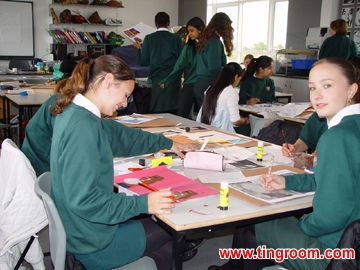听播客学英语 175 去中学
时间:2019-03-01 作者:英语课 分类:听播客学英语

In England, children normally start school when they are about five. They go to a primary school until they are 10 years old. Then they move to secondary school. This is big change for children. Secondary schools are much bigger than primary schools. Many children have to travel to secondary school on a bus or a train. There are new teachers and new subjects. And many unfamiliar 1 faces.
The move to secondary school is sometimes a big problem for parents too. Which secondary school will their children go to? In theory, parents can choose a school for their children. But some schools are very popular – for example, schools with good exam results, or good facilities – and others are not popular – for example, schools with poor exam results, or where the behaviour of the pupils is bad. In some secondary schools, there are not enough places for all the children who would like to go there. So there needs to be a way of deciding which children get places in the most popular schools and which do not.
The most common way of allocating 2 school places is to offer places first to children who already have an older brother or sister in the school, and then to children on the basis of how close to the school they live. In many parts of England, this system works well. But it can lead to schools in nice white middle class areas recruiting only nice white middle class children, while children from poorer social backgrounds go to other schools. Well-off parents can afford to buy a house close to a good school, to make sure that their children get places there; less well-off parents may not be able to do this. The result, some people say, is too much social segregation 3 – white middle class children at one school, poorer children at another. It is rather similar to the problem in many American cities of racial segregation in schools – some schools almost entirely 4 white, others almost entirely black.
Are there any alternatives? At one time, children in Britain sat an exam in their last year at primary school. It was called the “eleven-plus” exam, because it decided 5 which school children could go to from the age of 11. Children who did well in the exam went to schools called grammar schools, which offered an academic education. Children who did not pass the exam went to secondary modern schools, which offered a less academic and more practical education. This system still survives in place in England – including here in Birmingham. In theory, places in grammar schools are offered to pupils on merit, without regard to their social background, or how far from the school they live. In practice, however, middle class parents pay private tutors to prepare their children for the grammar school exams. The grammar schools are largely middle class schools and take only a few children from poorer families.
There are also faith schools in England. These are schools in the state school system which are run by a religious group. Most of them are Roman Catholic or Church of England schools, though there are some Jewish and Moslem 6 schools as well. So, Roman Catholic schools offer places first to children from Catholic families, and only accept children who are not Catholics if they have places left. And similarly with other faith schools. Many faith schools are good schools, and some middle class parents “get religion” in order to get a place for their child at a faith school.
The problem has been in the newspapers this week because in two places in England, the local authority has decided to that places at secondary schools will be offered by lottery 7 – in other words, the schools will offer places at random 8. It will no longer be important to live close to the school, or to pass an exam, or to go to church regularly. If you are lucky in the lottery, your child will get a place at a good school. If you are unlucky, they will not. This is very controversial. Will it be a good system for allocating places in good, popular schools? We shall have to wait and see.
Picture is of girls at Swanshurst School, Birmingham where my daughter goes to school
- I am unfamiliar with the place and the people here.我在这儿人地生疏。
- The man seemed unfamiliar to me.这人很面生。
- Administrative practice generally follows the judicial model in allocating burdens of proof. 在分配举证责任方面,行政实践通常遵循司法模式。
- A cyclical multiplexing technique, allocating resources in fixed-time slices. 以固定的时间片分配资源的循环复用技术。
- Many school boards found segregation a hot potato in the early 1960s.在60年代初,许多学校部门都觉得按水平分班是一个棘手的问题。
- They were tired to death of segregation and of being kicked around.他们十分厌恶种族隔离和总是被人踢来踢去。
- The fire was entirely caused by their neglect of duty. 那场火灾完全是由于他们失职而引起的。
- His life was entirely given up to the educational work. 他的一生统统献给了教育工作。
- This gave them a decided advantage over their opponents.这使他们比对手具有明显的优势。
- There is a decided difference between British and Chinese way of greeting.英国人和中国人打招呼的方式有很明显的区别。
- Moslem women used to veil their faces before going into public.信回教的妇女出门之前往往用面纱把脸遮起来。
- If possible every Moslem must make the pilgrimage to Mecca once in his life.如有可能,每个回教徒一生中必须去麦加朝觐一次。
- He won no less than £5000 in the lottery.他居然中了5000英镑的奖券。
- They thought themselves lucky in the lottery of life.他们认为自己是变幻莫测的人生中的幸运者。